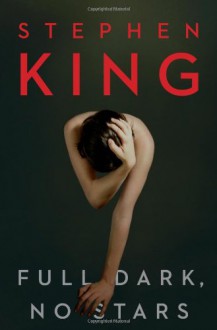
It’s safe to say that, by today’s standards, Stephen King’s novellas are actually novels. Especially his horror novellas. When you have publishers considering 35,000 words “novel length”, it makes you wonder what the actual difference is between a novel and a novella and whether or not the distinction will make a lot of difference in the coming years. Buddy of mine, Gregor Xane, thinks novellas suit horror just fine, that they are the perfect length to bring on the scares and then GTFO of Dodge. I tend to agree with him. But there’s something different about a King novella. They normally feel like novels twice their length. They feel packed to bursting with content. Think about Rita Hayworth and the Shawshank Redemption, think The Langoliers or The Mist. So once again, I wonder… What really makes a novel a novel. Is it truly length? Or the breadth of story?
This collection is bleak. There’s not a bright moment to be found, hence the title. Let’s discuss what that entails, shall we?
1922: Sweet baby Tom Cruise this story is disturbing. It’s one of those tales that make you feel dirty after completing it. What Wilf and Hank do is irredeemable, but somehow, I feel bad for the both of them by story’s end. That’s damn good writing, if you ask me. That’s having humanity nailed down to where it’s likely never to move again.
Big Driver: Rape. Does that word make you uncomfortable? Probably. Even if you’re not a victim, or don’t know a victim, you’re liable to cringe just reading it. But what about ‘revenge’? Does that word make you smile? Well, even though the revenge in this tale is not easily won or pretty in nature, I still grin like a mad bastard reading about these fuckers getting their comeuppance. And speaking of the word ‘rape’, King uses it a lot in this story. He doesn't pull any punches. There’s one page where it seems like every other word is that word. I feel he was trying to drive home the stark horror of the situation by pummeling us with repetition. "You will read this. You will know. You will see."
Fair Extension: The shortest of the tales, this one is my favorite. In King’s short story, “The Man in the Black Suit”, which appears in Everything’s Eventual and won an O. Henry Award, King comes right out and tells us who the bad guy is. In this one, the story’s more sinister for its allusions. You know who this guy is bartering with, I know who he’s bartering with, even the character knows, but no one ever says it. Because that’s what gives monsters their true power – acknowledgement. The boogeyman isn’t scary until you believe he is.
A Good Marriage: I love this one for its simple truths. You never truly know another human being, no matter how long you might live with them. King used the serial killer known as BTK for inspiration, and the reader is left wishing that this had been the actual outcome.
In summation: In my opinion, King shines brightest when he’s working with novellas. I can name numerous bad novels and short stories of his, but I can’t think of a single novella from him that I’ve disliked. What do you think? Can you name one, and why didn't you like it?
Final Judgment: Five stars, but not a single one to brighten your mood.

 Log in with Facebook
Log in with Facebook 









